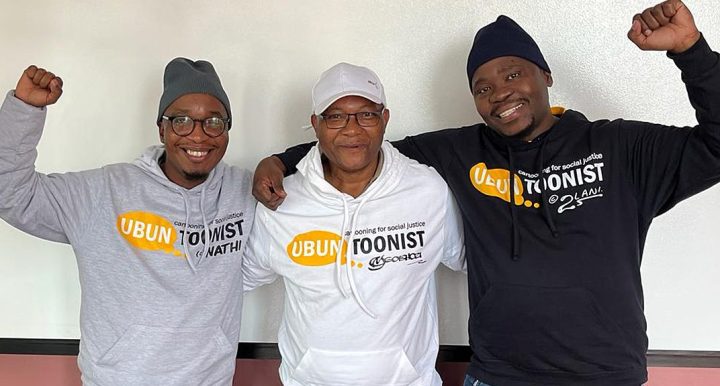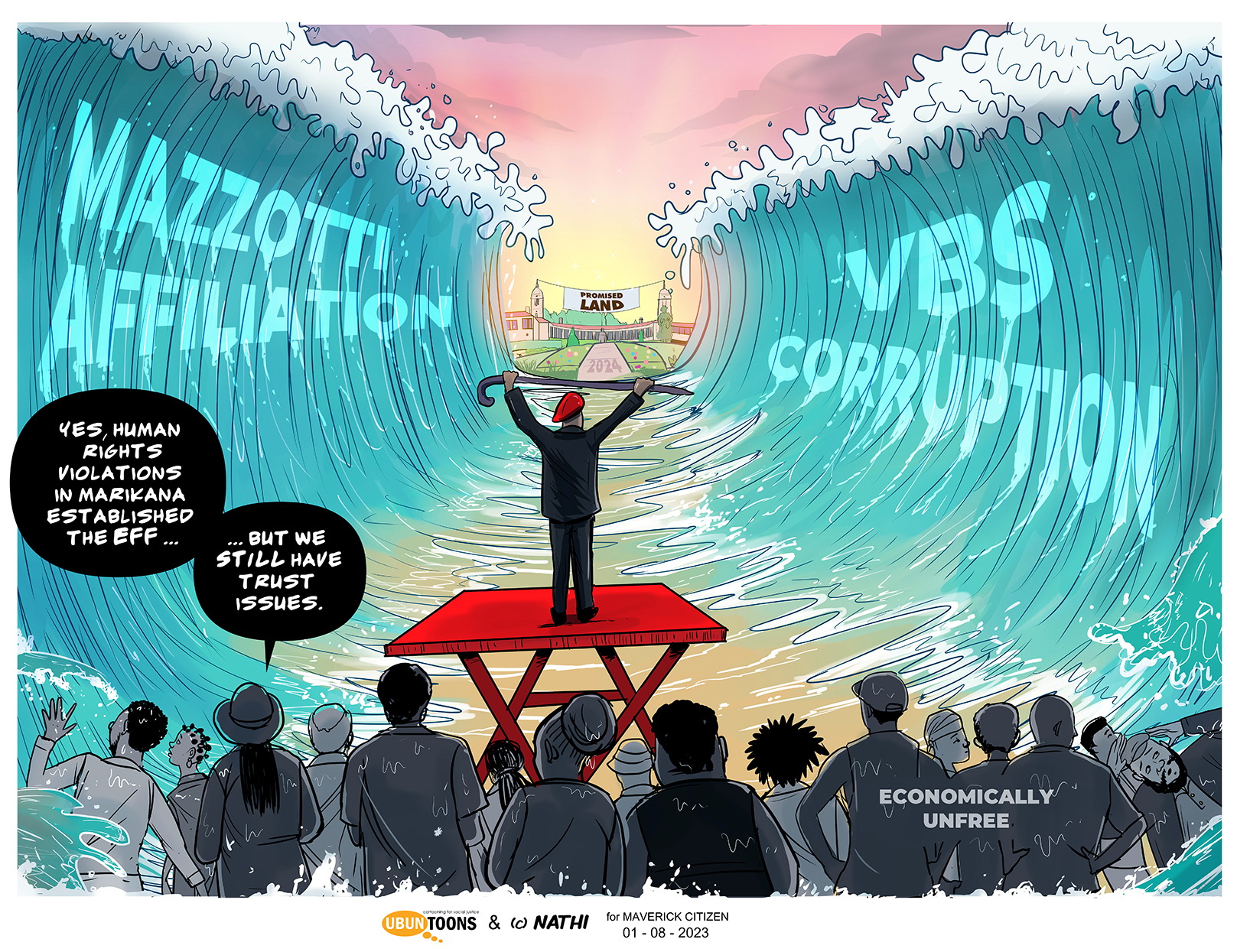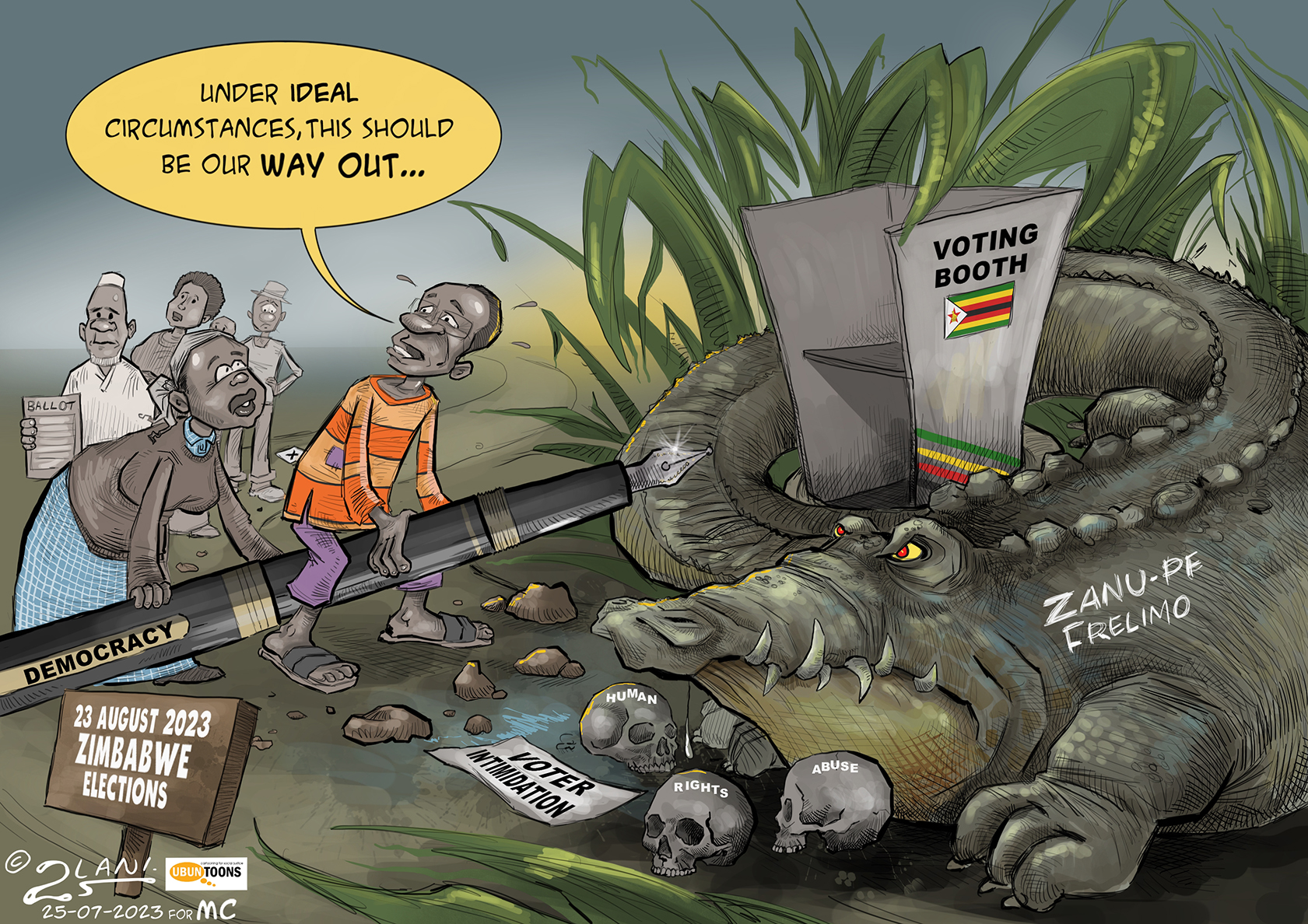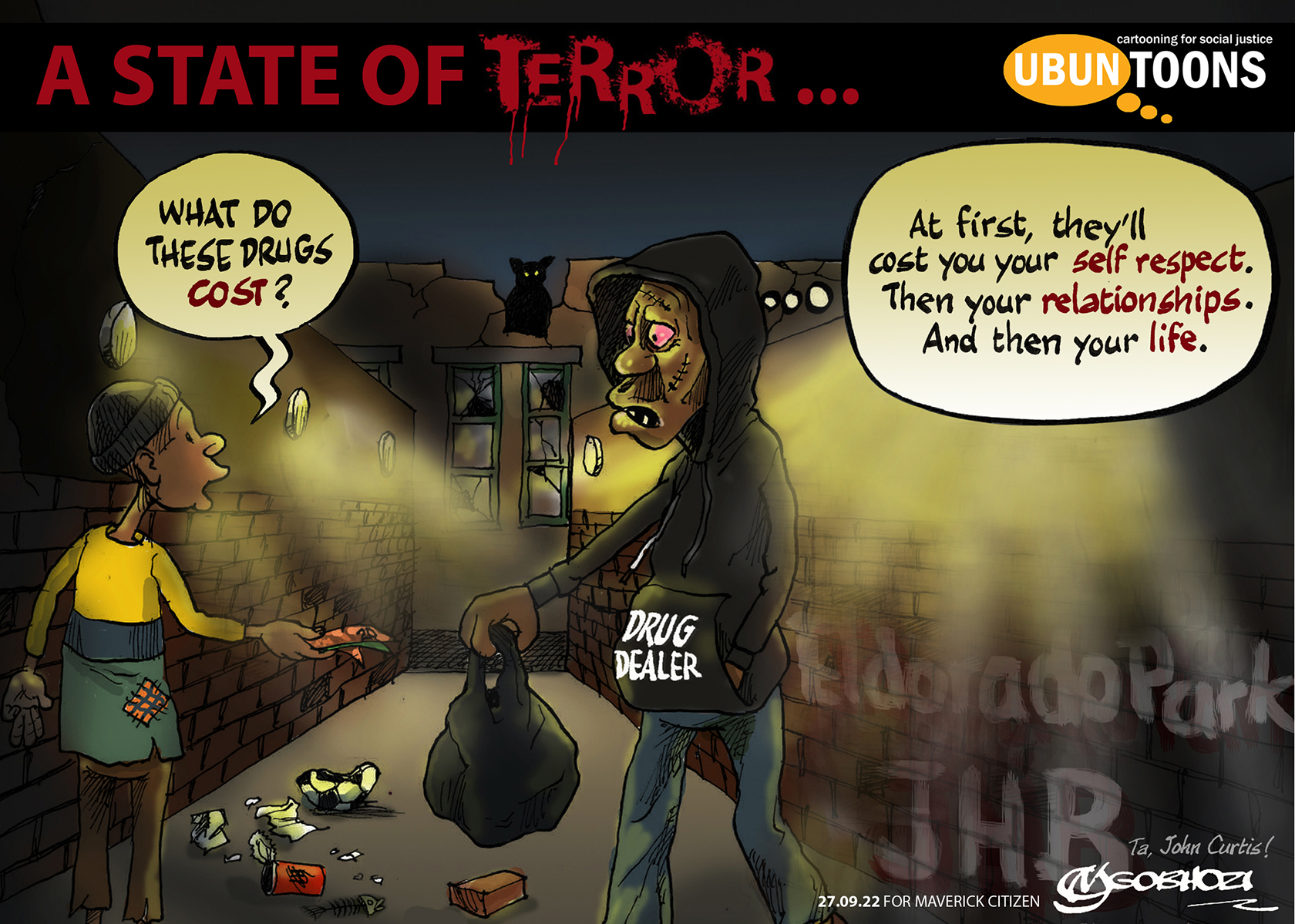PUSHING THE BOUNDARIES
Meet the Ubuntoonists, the trio taking a stand for social justice – one cartoon at a time

‘I remember the backlash I got over a cartoon about a Miss South Africa and Palestine. I got many threats and I was called anti-Semitic and such things – it was the longest week of my life.’
Zuma, Trump, Malema – it’s not difficult to turn some politicians into cartoons. Trickier, though, is how to use cartooning to highlight social injustices; to faithfully represent the voiceless and to make society’s most vulnerable visible, sometimes all in a single frame.
For the “Ubuntoonists” – Maverick Citizen’s team of freelance cartoonists made up of 2lani (Thulani Ntsong); Nathi (Nathi Ngubane) and Mgobhozi (Wilson Mgobhozi) – rising to this challenge holds deep personal responsibility for them.

Parting of The Red Sea, by Nathi.
Since the Maverick Citizen cartoons were launched about three years ago, it’s also turned out to be a platform for them to shift their creative talents to something that goes beyond drawing purely for political sting, to creating works that have the potential for greater societal impact – to raise awareness of human rights violations, inequality, the climate crisis and gender inequality.
For Nathi, a Soweto local who grew up in Chesterville in KwaZulu-Natal, creating a cartoon begins with tapping into the news of the day. He’s also always trying to understand how people feel about the issues that make the newspapers and bulletins.
He says: “I grew up in the same communities of the people who are not getting basic service delivery. So when I’m in the taxi, I listen to what people are saying. I listen to the concerns of the grandmothers and the grandfathers.”
He’s mindful that his cartoons should be relatable and not text-heavy.
“I always try to play on the image. I know that English is not quite understood by everybody, so I aim to make the images relatable – people should identify and recognise themselves or the situation in my cartoons,” he says.
With each cartoon he draws, there’s a story he hopes to convey and a narrative he deliberately shapes. It’s something he says he picked up from watching Disney movies.
“Every day after school I watched the Lion King; my dad used to get me so many videos back in the 1990s. It’s how I learnt English and how I fell in love with storytelling and animation. Simba was my favourite and Disney taught me about animation… about conveying emotion and storytelling.
“Sometimes I’d draw a funny cartoon about school politics or something that was happening and I’d put it on the library noticeboard. People started to notice my art and talent, so I was getting more encouraged.
“At the same time, I started to notice newspaper cartoons and the cartoonists out there and I realised, like, ‘wow, you can use your art to make statements about things’,” he says.
For his fellow Ubuntoonist, 2lani (Thulani Ntsong), the journey to cartooning came with a realisation that it also had a licence for satire and parody unique in the media space.
There’s humour and caricature, wit and pithy punch lines. Great cartoons can make dense issues instantly clearer – a single frame can be a take-down, and it can turn a joke on bullies and baddies in a few artistic strokes.

Zimbabwe Hopeless by 2lani.
Thulani feels that having access to such creative muscle should translate into making sure that social justice cartoons don’t shy away from pushing boundaries or slaying sacred cows.
“I remember the backlash I got over a cartoon about a Miss South Africa and Palestine. I got many threats and was insulted… I was called anti-Semitic and such things. It was the longest week of my life.
“But I do think that we need to use cartoons to make a point. There are strong issues that need to be addressed,” he says.
Any reaction is, after all, better than deafening silence because attention means people can start reckoning with things that have gone wrong for too long, he says. He mentions the challenges he experienced while growing up.
“I grew up in Limpopo in a place called Leeuwfontein. It’s tough out there… The last time I went home, I could see that people were still going to streams and rivers to get water. They haven’t had running water for, like, 20 years. There are taps and pipes so the infrastructure is there, but not one drop comes from the taps.”
Even though he has a day job working in diagnostic imaging in occupational health and safety for a mine in Barberton, it is art – especially art with a purpose – that drives him.
Art is also what connects Thulani to his late father, Gabriel Sibiya. His dad died when he was a toddler, but over the years Thulani has grown to know him through the artworks his uncle held on to.
“I found out that he was left-handed like I am. I think his style was more meticulous and I’m more laid back,” he says.
But he admits that, like most artists, when he presses the send button on a cartoon he’s emailed, he immediately thinks of the things he might have drawn differently.
Someone like Mgobhozi might tell him to relax a little more, and to trust his art. Mgobhozi is the third leg of the Ubuntoonist tripod. He’s a veteran cartoonist that both Nathi and Thulani grew up admiring – and still do.
Mgobhozi took a long route to newspapers and cartooning, including teaching in the 1980s – art being one of the subjects, of course. But he got his first job on the papers in the mid-1990s and since then, his name is a familiar signature on some of the country’s celebrated archives of memorable cartoons.
Included among the thousands he’s produced are his 2016 “Ubuntu – sharing is Caring” cartoon that was featured as part of the Gallery of the Best World Cartoons by the Cartoon and Caricatures Information Centre in 2021.
“Sometimes I feel on top of the world, but it’s also surreal,” he says, of having drawn the history of the country for close to three decades.

State of Terror, by Mgobhozi.
He often thinks back to how it all started. He remembers family “draw-offs” during rainy days in Amanzimtoti, where he grew up. Even in a family of artistic people, he often claimed top spot in these fun competitions.
Mgobhozi says that working as part of a cartooning collective focused on social justice rather than politics has been a career turning point – as has learning to take his old-school drawing methods into the digital era, he jokes.
“I never liked politics. Growing up in KZN in the years of political turmoil meant that there was all this violence around me and I didn’t want anything to do with that.
“What we’re doing with Maverick Citizen is something fresh. These are cartoons that stand for the downtrodden, for the sufferers, and if we keep banging on the door long enough, people will sit up and notice that we are not just talking about politics, but about social justice, about the people,” he says.
It’s the people, always the people – that’s where Ubuntu begins. DM



















Viva the Ubuntoonists, Viva! So proud to have worked with this troika of ‘toonists in the early days of Maverick Citizen’s ‘Cartoons for Social Justice’ initiative, and to watch them grow from strength to strength, producing great cartoons every week.
Almost thirty years since liberation, and at long last; South Africa’s cartooning space is occupied by quality cartoonists that are more representative of the country’s racial diversity than ever before, bringing fresh and relevant voices to the gigs, and inspiring younger talents to follow them into the field. The talent has always been there, but the opportunities have not, and that is now changing – with Maverick Citizen leading the way. Long may it last.